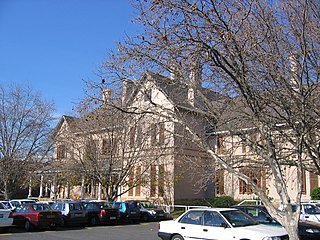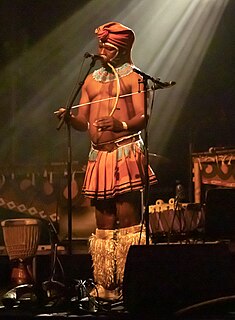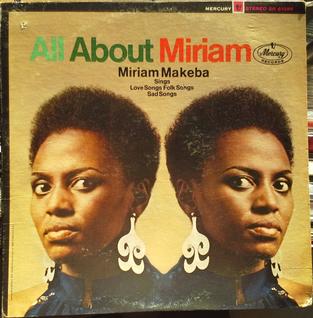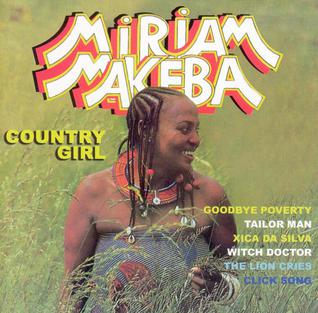Related Research Articles
Xhosa music has long been a major part of the music of South Africa, especially in the field of jazz. There are many Xhosa clans, each with their own styles of drumming and dialects.

Langa is a township in Cape Town, South Africa. Its name in Xhosa means "sun". The township was initially built in phases before being formally opened in 1927. It was developed as a result of South Africa's 1923 Urban Areas Act, which was designed to force Africans to move from their homes into segregated locations. Similar to Nyanga, Langa is one of the many areas in South Africa that were designated for Black Africans before the apartheid era. It is the oldest of such suburbs in Cape Town and was the location of much resistance to apartheid.

Mahlathini and the Mahotella Queens were a South African mbaqanga supergroup made up of the three musical acts linked together by talent scout and record producer Rupert Bopape at the Gallo Recording Company in Johannesburg, South Africa in 1964. The group composed of the following three distinct parts:

The South African College of Music, abbreviated as SACM, is a department of the Faculty of Humanities at the University of Cape Town. It is located on the University's Lower Campus in Rondebosch, Cape Town.
Mountain Records is a record label started in Cape Town, South Africa in 1980 by Patrick Lee-Thorp.

Dizu Plaatjies is a Xhosa musician best known for being the founder and former leader of the South African group, Amampondo. He is a graduate of the South African College of Music, University of Cape Town where he lectures in African Music.
Mandla Langa is a South African poet, short-story writer, novelist, and cultural activist. He grew up in KwaMashu township of Kwazulu Natal. His novel The Lost Colours of the Chameleon won the 2009 Commonwealth Writers' Prize . Langa enrolled for a degree in English and Philosophy at the University of Fort Hare, but was expelled in 1973 as a result of his involvement in the activities of the South African Student Organisation. In 1976, he went into exile and has lived in different countries of Southern Africa as well as in Hungary and the United Kingdom.

Bopasenatla Secondary School is a government secondary school in Diepkloof, Soweto. It was previously known as Junior Secondary School.
ukhandampondo is the second album by the South African music project Bambata, released in 2002. It continues on the themes of the first album 1906, focusing on the year 1906 and the Bambatha rebellion against English and the poll tax the latter had created.
Jeff Maluleke is a South African musician of the M'nwanati people. Jeff was born to Dora and Johannes Maluleke in the town of Bushbuckridge, Mpumalanga in 1977. In 2002, the Kora All-Africa Music Awards honoured him as the "Revelation of the Year".

Mango Groove is the self-titled debut album of Mango Groove, a South African pop fusion band whose sound is influenced by township music. Seven of the eleven songs on the album were released as singles. The album sold extremely well, breaking national sales records and maintaining a high rank in the radio charts for a year. The band dedicated the album to Mickey Vilakazi, a bandmate who died in June 1988.
Ding Dong is the 1994 breakthrough second album of Joe Nina. Both the album and the title track "Ding Dong" became major hits.

All About Miriam is the 1966 ninth studio album of Miriam Makeba Arrangements for the album were by Luchi DeJesus and Sivuca. Sivuca also played guitar. Harold Dodson played bass, and drummer was Leopoldo Flemming.
A Promise is a 1974 album by Miriam Makeba. David Axelrod was responsible for the string arrangements.
Miriam Makeba & Bongi is a 1975 album by Miriam Makeba, released by Editions Syliphone Conakry.

Country Girl is a 1978 album by Miriam Makeba. The album was recorded in Kumasi, Ghana, but completed in New York City with members of Ipi Tombi.

Eat a Mango is the fourth album by Afropop music group Mango Groove. It was released by Tusk Music in November 1995. In 1996, Eat a Mango won a SAMA in the category "Best Adult Contemporary Performance: English" at the second annual South African Music Awards. The band recorded music videos for three songs from the album: "Eat a Mango", "New World ", and "Right Time".

Another Country is the third album by South African Afropop fusion band Mango Groove. It was released in 1993, near the end of the negotiations to end apartheid in South Africa. The album was released in South Africa on cassette and CD by One World Entertainment, an imprint of Tusk Music.
Tsakani is the second album by Tsakani Mhinga. Like its predecessor it won the South African Music Awards R&B Best Album.

Mina Nawe is the fifteenth studio album by South African singer Brenda Fassie. The record was released on January 2, 2001, by CCP Records. Fassie wrote most of the album's songs with Sello Chicco Twala.
References
- "African drumming masters play Queens Head as warm-up to Festival". Monmouth Town Crier. 28 July 2005. Archived from the original on 27 September 2007.
- Bradshaw, Paul (September 1993). "Outernational Meltdown". Melt2000. Archived from the original on 5 February 2012. Retrieved 11 December 2011.
- Syren, Christian. "Amampondo (South Africa)". Music.org.za. Retrieved 11 December 2011.
- World Music: the Rough Guide: Africa, Europe and the Middle East by Simon Broughton, Mark Ellingham & Richard Trillo (1999) Rough Guides ISBN 1858286352, ISBN 978-1858286358
- Gather into One: Praying and Singing Globally (Calvin Institute of Christian Worship Liturgical Studies Series) by C. Michael Hawn (2003) Wm. B. Eerdmans Publishing Company, ISBN 0802809839, ISBN 978-0802809834
- Beyond Memory: Recording the History, Moments and Memories of South African Music by Max Mojapelo, Sello Galane and Chris Walton (18 Mar 2009) African Books Collective Limited ISBN 9781920299286